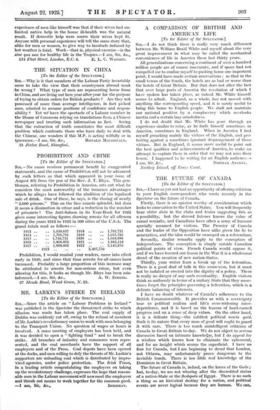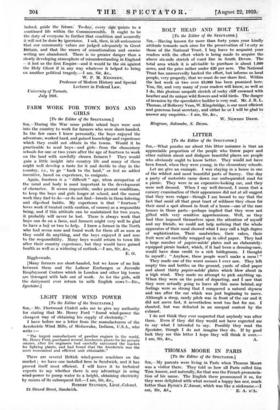THE FUTURE OF CANADA [To the Editor of the SPECTATOR.]
SIRS I have as yet not had an opportunity of offering criticism to your English correspondent who wrote recently in the Spectator on the future of Canada.
Firstly, there is no opinion worthy of consideration which looks to annexation to the United States. You will frequently hear obiter dicta in the clubs and trains suggesting this as a possibility, but the shrewd listener knows the value of casual remarks, and Canadians have often a sense of humour specially assumed for visitors. The Premier of Canada and the leader of the Opposition have alike given the lie to annexation, and the idea would be swamped on a referendum.
Secondly, similar remarks apply to the conception of independence. The conception is simply outside Canadian political points of view. French Canada would oppose it, and if we have learned one lesson in the War it is a wholesome dread of the creation of new nation-States.
Thirdly, your writer fears a break up of the federation. There is a good deal of talk in this connexion, but it must not be isolated or erected into the dignity of a policy. There is really no danger of any such eventuality. English visitors think so uniformly in terms of a unitary State that they some- times forget the principles governing a federation, which is a delicate balancing of interests.
I have no doubt whatever of Canada's adherence to the British Commonwealth. It provides us with a sovereignty true to political realism and life's ever-widening inter- dependence, and it is based on the lessons of hard-earned progress and on a sense of deep values. On the other hand, it is a delicate thing—the subtlest political nescio quid. Such is its nature that every man of good will ought to guard it with care. There is too much unintelligent criticism of Canada in Great Britain to-day. We do not object to serious discussion based on intimate knowledge, but I do appeal for a wisdom which knows how to eliminate the ephemeral, and for an insight which scorns the superficial. I have no fear for Canada, but I am beginning to dread that London, not Ottawa, may unfortunately prove dangerous to the invisible bands. There is too little real knowledge of the Dominion in Great Britain.
The future of Canada is, indeed, on the knees of the Gods ; but, to-day, we are not whoring after the discredited status of a nation-State or the fleshpots of Egypt. There is no such a thing as an historical destiny for a nation, and political events are never logical because they are human. We can, indeed, guide the fiture: To-day; every sign Violins to a continued life within the Commonwealth. It ought to be the duty of everyone to ffirther that condition tmd assuredly it will not be done by ignorance. I ask, then, all seriousness that our community values are judged adequately' in Great Britain, and that the snares of sensationalism and unwise writing are abandoned. There is no greater danger than a slowly developing atmosphere of misunderstanding in England --it lost us the first Empire—and it would be the sin against the Holy Ghost if in any way whatever it helped to bring on another political tragedy.—I am, Sir, &c.,
W. P. M. KENNEDY, Professor of Modern History and Special Lecturer in Federal Law. University of Toronto.
July 18th.



































 Previous page
Previous page